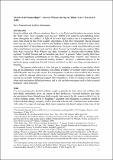‘Bereft of all human help?’ : Scottish widows during the Thirty Years’ War (1618-1648)
Abstract
The role of Scottish officers and soldiers during the Thirty Years’ War has received considerable scholarly attention in the last two decades. Historians such as Alexia Grosjean and David Worthington have established that thousands of Scots served the Scandinavian and Imperial armies during the first half of the seventeenth centuries often embarking on remarkable military careers. Their research mainly focused on the experience of officers and moved the narrative from one of simple mercenary engagement to a more nuanced understanding which has covered such issues as motive, recruitment and command and control of various armies in the conflict. It is a startling point that the vast majority of these men, whether generals or private soldiers, lost their lives during service. What has so far been neglected is an analysis of the role and fate of those who depended on these men: their widows and dependent children who travelled with the armies. This article seeks to fill this gap by analysing a compendium of over fifty letters obtained from Swedish and Dutch archives which were written by women who lost their husbands as a result of the conflict. In particular, the article will zoom in on individual cases like that of Margaretha Forrat, the wife of Colonel James Spens of Wormiston. After her husband’s death in 1632 Margaretha implored the Swedish chancellor Axel Oxenstierna and other high-ranking officials for financial help for herself and her children. This was eventually granted proving that Margaretha managed to successfully lobby and to exert influence over the Swedish authorities. Other widows such as Elizabeth Clerck (whose husband James Drummond died in 1645) were less successful. Indeed, as the records of widow’s petititions to the Dutch authorities show, gaining pensions or support after the death of a soldier was something of a lottery for the women left behind and other avenues of support had to be sought. The widow of Sergeant Bruce was not even accorded her own name in the judgement of the Dutch authorities denying her pension. Analysing the networks and activity of women like Margareta Forrat, Elizabeth Clerck will help us understand the degree to which they were embedded into the Swedish and Dutch military and social elite and to determine which factors allowed them to become agents of their own fate or made them victims of adverse circumstances. Consideration will also be given to the wives of soldiers from the lower ranks, such as ‘Widow Bruce’ which highlight the differing attitudes and care given to their support. As such the article will contribute to our knowledge of the impact of war on women, their agency and the perception of women and family relations by the Swedish and Dutch authorities and the intimate networks to whom they also turned to for support.
Citation
Murdoch , S & Zickermann , K M G 2019 , ' ‘Bereft of all human help?’ : Scottish widows during the Thirty Years’ War (1618-1648) ' , Northern Studies , vol. 50 .
Publication
Northern Studies
Status
Peer reviewed
Type
Journal article
Collections
Items in the St Andrews Research Repository are protected by copyright, with all rights reserved, unless otherwise indicated.

